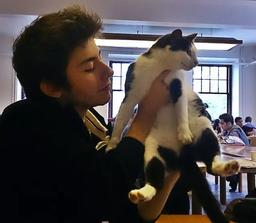Now let's look at a basic conversation in Turkish:
| Merhaba. Ben George. | Hello. I am George. |
| - Merhaba George. Ben de Zeynep. | - Hello George. I am Zeynep. |
| Memnun oldum, Zeynep. | Pleased to meet you, Zeynep. |
| - Ben de memnun oldum. | - I am also pleased to meet you. |
| Nasılsın? | How are you? |
| - Iyiyim. Teşekkür ederim. Ya sen? | - I am fine. Thank you. And you? |
| Ben de iyiyim. Sağ ol. | I am also fine. Thanks. |
| - İstanbul'da ne yapıyorsun? | - What are you doing in Istanbul? |
| Üniversitede okuyorum. Ya sen? | I am studying at the university. And you? |
| - Ben de üniversitede okuyorum. | - I am also studying at the university. |
| Peki, ben gidiyorum. | Well, I am going. |
| - Tamam. Görüşürüz. | - Okay. See you. |
| Görüşürüz. | See you. |
The word dE means too or also and is used two times in the conversation. Note that this word changes according to minor vowel harmony depending on the preceding vowel, even though there is a space before dE. Don't confuse the word dE with the locative case suffix, which is written attached to the word it follows. Notice that dE can also mean as for me in conversational contexts.
Memnun oldum literally means I became pleased. Oldum is a verb in the past tense, which you will learn to use later.
Teşekkür ederim literally means I thank (you). Ederim is a verb in the simple present, which you will also learn to use later. The form teşekkür ederiz, meaning we thank (you), can be used if you want to thank someone on behalf of multiple people.
Sağ ol and the slightly more polite sağ olun literally mean be alive.

